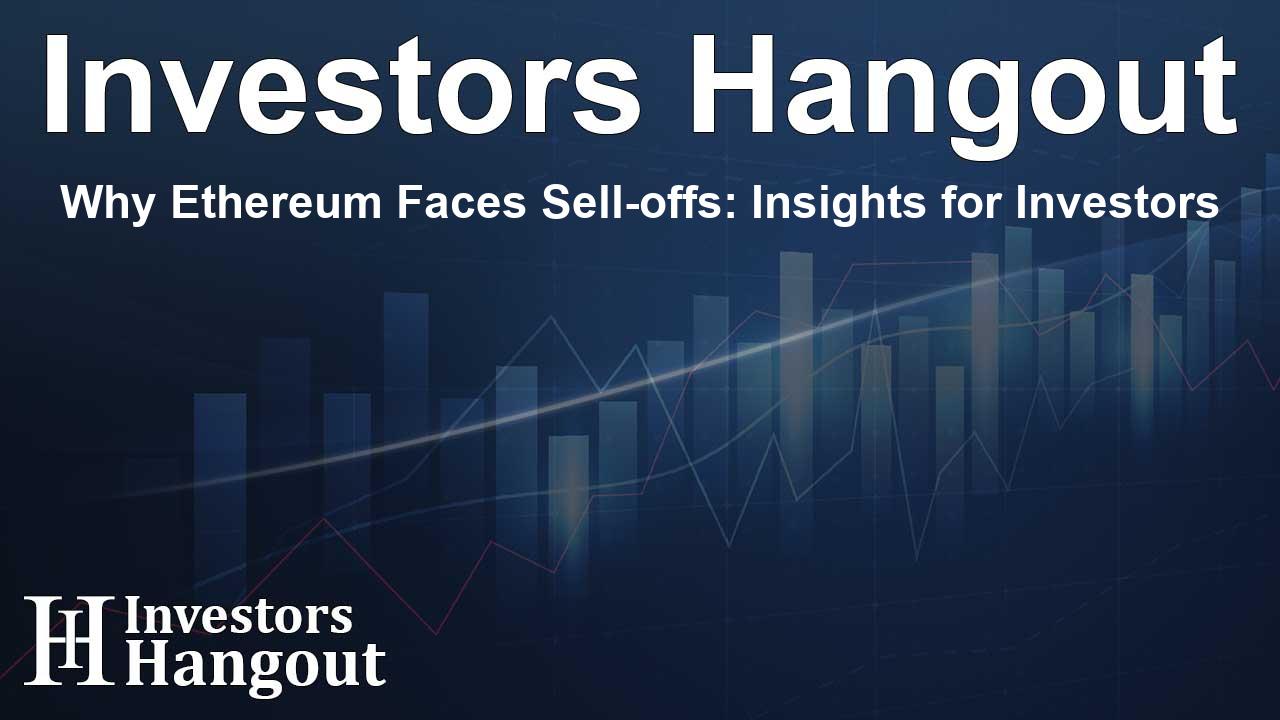Why Ethereum Faces Sell-offs: Insights for Investors

Current Status of Ethereum (CRYPTO: ETH)
Ethereum, the world's second-largest cryptocurrency, has seen a modest gain of around 6% this year. However, it's worth noting that the asset has suffered a nearly 25% drop in the last three months. In stark contrast, Bitcoin (CRYPTO: BTC) has surged by 50% since the beginning of the year, prompting concerns about Ethereum's performance among investors.
Impact of Ethereum ETFs on Investor Sentiment
A recent catalyst for Ethereum was the anticipated launch of new spot Ethereum ETFs expected at the end of summer. Similar to the surge witnessed with Bitcoin ETFs, analysts predicted that these new Ethereum products would drive prices up as the year progressed. Yet, instead of substantial inflows, only about $1.5 billion has entered the two leading new ETFs — the iShares Ethereum Trust (NASDAQ: ETHA) and the Fidelity Ethereum Fund (NYSEMKT: FETH). This is significantly below the roughly $4.8 billion projected by experts.
Investors Remain Cautious
Although it's early to label the new spot Ethereum ETFs a disappointment, the sentiment among experts suggests growing frustration. Analysts have pointed out that the inflows into these ETFs have not met expectations, raising concerns about whether they can stimulate Ethereum's price in the final months of the year.
Trends in Investor Outflows
Recent trends indicate considerable outflows from spot Ethereum ETFs, startling some investors. This behavior manifested notably in October, when the Fidelity Ethereum Fund saw approximately $25 million leave the fund in a single day, marking the highest outflow recorded.
Examining Market Trends
Data from CoinShares, which tracks institutional investments in cryptocurrencies, reveals persistent outflows. For six out of the last seven weeks, Ethereum experienced net outflows, including a notable instance where almost $100 million exited in September. These trends highlight a broader hesitation among institutional investors towards Ethereum.
Understanding Billionaires' Decisions to Sell
With prominent billionaire fund managers opting to divest their Ethereum holdings, questions arise about their motivations. One of the primary factors seems to be a perceived lack of upside potential compared to Bitcoin, especially as Bitcoin garners attention as a potential hedge against inflation and economic instability.
Analyzing Investor Perspectives
Additionally, once Bitcoin is included in a long-term portfolio, some investors may not see the need to hold onto Ethereum, leading to a shift in strategic asset allocations towards other opportunities in the cryptocurrency space.
Should You Consider Investing in Ethereum?
Given the current market climate and billionaire investors’ movements, individuals eyeing Ethereum as an investment must carefully assess their strategies. If your investment horizon is brief—about 12 months or less—it may be wise to reconsider. Alternatively, long-term investors might still find a compelling case for Ethereum, known for its strong historical performance and innovation.
Seizing New Investment Opportunities
This could be a pivotal moment to explore new investment opportunities, particularly if you feel you missed earlier chances with leading stocks. The landscape of investments is continually evolving, and even in times of uncertainty, some opportunities can flourish.
Investing in Ethereum may present potential risks, especially given the current outflow trends, but for investors committed to a longer timeframe, the ability to tap into the platform's historical strengths could be rewarding. Stay vigilant and proactive in following market changes, as they may lead you to potential breakthroughs in this dynamic financial landscape.
Frequently Asked Questions
What is the current performance of Ethereum?
Ethereum has shown a modest increase of around 6% this year but has declined nearly 25% over the past three months.
Why are institutional investors selling Ethereum?
Billionaire investors believe Bitcoin presents better prospects for growth and serves as a hedge against economic downturns, leading them to shift away from Ethereum.
What impact have the new Ethereum ETFs had on the market?
The newly launched Ethereum ETFs have not drawn the anticipated inflows of capital, with only about $1.5 billion invested compared to projections.
How have recent trends influenced Ethereum's investor base?
Recent data shows significant outflows from Ethereum funds, indicating a lack of robust interest among institutional investors.
Should I invest in Ethereum now?
It depends on your investment horizon; for those looking long term, Ethereum could still be an option, but short-term investors should proceed with caution.
About The Author
Contact Kelly Martin privately here. Or send an email with ATTN: Kelly Martin as the subject to contact@investorshangout.com.
About Investors Hangout
Investors Hangout is a leading online stock forum for financial discussion and learning, offering a wide range of free tools and resources. It draws in traders of all levels, who exchange market knowledge, investigate trading tactics, and keep an eye on industry developments in real time. Featuring financial articles, stock message boards, quotes, charts, company profiles, and live news updates. Through cooperative learning and a wealth of informational resources, it helps users from novices creating their first portfolios to experts honing their techniques. Join Investors Hangout today: https://investorshangout.com/
The content of this article is based on factual, publicly available information and does not represent legal, financial, or investment advice. Investors Hangout does not offer financial advice, and the author is not a licensed financial advisor. Consult a qualified advisor before making any financial or investment decisions based on this article. This article should not be considered advice to purchase, sell, or hold any securities or other investments. If any of the material provided here is inaccurate, please contact us for corrections.
